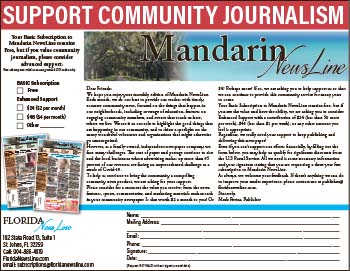By Master Gardener Volunteer Lesley Arrandale
mail@floridanewsline.com
After a very mild winter, summer came early — and with a vengeance. The seasons roll around with the usual regularity, but it seems increasingly clear to me that our climate is changing, whether it’s agreed or not that we are responsible. Levels of carbon dioxide in our atmosphere have been increasing rapidly since pre-industrial times, which should be very concerning as this affects all life on earth (https://tinyurl.com/yy4p4w34). For example, in late June, Europe was sweltering in an unprecedented heatwave, with terrible repercussions (https://tinyurl.com/yywuu26k) and Alaska snow melt has been causing alarm: https://tinyurl.com/y3ymk6ar.
Gardeners can help in small, but cumulative, ways. Where possible, we can reduce our use of gas-powered equipment in favor of cleaner electric or battery-powered options. Our local air quality will be improved and our neighborhoods more peaceful. There is also a movement to reduce digging, as carbon is kept in the ground when the soil is undisturbed. Instead of digging all weeds out by the roots, use a sharp garden knife to cut round larger tap roots and pull them out while leaving small roots to rot in the ground (unless you know those pieces of root will produce new plants, like Florida betony does!). Do your best to pull the weeds through your fingers, keeping as much of the soil in place as possible. Annual weeds can be cut off at the roots. The soil won’t be completely turned over so many weed seeds can be kept underground and fewer tiny beneficial organisms will be destroyed. In addition, more of the fungal threads that develop in the soil which often help in nutrient transfer to plants will be left intact. Consider adding a thin layer of compost to introduce more beneficial organisms to your soil.
With plenty of native passion vines (Passiflora incarnata) around my yard, I’ve been enjoying seeing many gulf fritillary and zebra longwing butterflies, and hoping for some young caterpillars to carry on their line. Unfortunately nature has added some large predatory wasps into the mix, and although I don’t fear for myself — they aren’t yellow jackets — I’ve found very few caterpillars recently and suspect they’ve been eaten. I haven’t identified the culprits, but I did see one huge wasp chowing down on a sizeable monarch caterpillar, after discovering that at least a dozen other small ones had mysteriously disappeared. As we know, the milkweeds that the monarch caterpillars eat contain a toxin that accumulates in the caterpillars. Birds cannot stomach the toxin, but clearly wasps aren’t similarly affected.
The largest wasps in Florida are the cicada killers, which thankfully do not sting us unless we grab or otherwise harass them. Even then, the insect has to be female as the males are defenseless. (Their lifecycle is fascinating — the female controls the sex of her eggs. You can read about it here: https://tinyurl.com/yxvpe3hv.) It makes me wonder how the newly-emerged cicada I saw recently is faring.
I was also surprised to see a ruby-throated hummingbird feeding on the passion flowers. They like my native fire bushes (Hamelia patens), with their clusters of orange-red long trumpet-shaped flowers, but the complex purple passion flowers are very different structurally. Other vines to support hummingbirds include natives like trumpet honeysuckle (Lonicera sempervirens), cross-vine (Bignonia capreolata), and trumpet vine (Campsis radicans). You can find comprehensive information on these and other vines, including how they might best be used, here: https://tinyurl.com/y6r6n97b.
For timely advice, the University of Florida website has a gardening calendar with information specifically for north Florida: http://edis.ifas.ufl.edu/ep451, as well as the invaluable Florida Vegetable Gardening Guide: https://edis.ifas.ufl.edu/vh021. Chris Kerr has published his first New Leaf newsletter for July/August, so please check that out at http://sfyl.ifas.ufl.edu/duval/lawns-gardens-and-trees/new-leaf-newsletter/.








